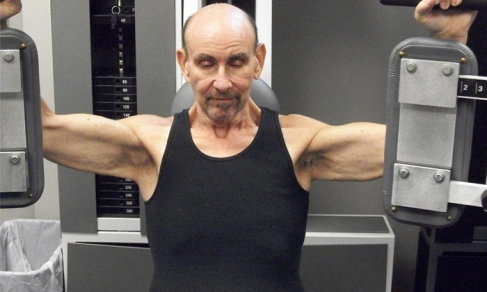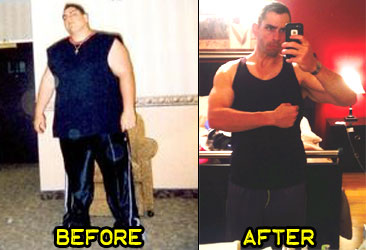Motivation
More Motivation
Articles
From “Porker Pat” to “Iron Gimp”
Crippled by three strokes, “Porker Pat” Quinn lost over 100 pounds, learned to walk again, and now uses his amazing story to help others.

Now a slender 135 pounds, Pat irreverently refers to his former self as “Porker Pat”—a five-foot six inches tall, 247-pound “fat guy” with a penchant for rich foods and a tendency to lounge on the couch all day long. Not only was Pat dangerously obese, he also struggled with diabetes, high blood pressure and acid reflux. But Pat’s poor health habits would soon catch up with him, with near-fatal consequences.
In 2007, Pat suffered a transient ischemic attack (TIA), or mini-stroke, that caused him to tumble down a flight of stairs and almost break his neck. Following on the heels of that, Pat experienced his second stroke—a right-hemisphere clot—in May 2007 and began a three-week stay at the hospital.
The incident was something of a wake-up call for Pat, who had largely neglected his health for most of his adult life. That first night in the hospital, Pat vowed to shape up and lose weight. “I knew I was to blame for what had happened to me. I didn’t want to have another stroke,” Pat says. “I wanted to do something about it.”
Fully aware that good health was crucial for preventing another stroke, Pat started to practice better eating habits in the hospital, which he brought home with him when he was discharged three weeks later. “I cut out all sodium, sugar and simple carbohydrates,” he says. “I am 99% vegan. I eat a lot of fresh produce, no meat at all.”
Unfortunately, in spite of his lifestyle changes, Pat experienced a third stroke in September 2008, a left-hemisphere hemorrhagic stroke that destroyed precious brain tissue and temporarily wiped out Pat’s memory function. This time, Pat feared that he wasn’t going to make it through the night: “As they struggled to get my 200 lbs onto the stretcher I thought, ‘So, this is it,’” Pat recalls.
Miraculously, Pat survived—but he would never be the same again. The stroke impaired Pat’s cognitive and physical functioning, such that he could barely walk, talk, chew or swallow without assistance. After five weeks of hospital care, Pat was admitted to a nursing facility/rehab center in a wheelchair and was told he would never walk again. “I succeeded in ruining parts of my brain that I had depended on all my life, at the same time nearly sentencing myself to a life of dependency in a wheelchair,” Pat says.
Rather than succumb to hopelessness, however, Pat took action, tackling his recovery with a little patience, faith and tremendous strength. Pat made a pact with himself: that he would one day walk out of the rehab center unassisted, with a cane or walker if necessary. “When I voiced this goal to my first physical therapist, he simply looked at me,” Pat says.
Progress was slow, but Pat’s resolve did not falter. He counted each minor improvement as a major triumph. With intensive therapy, he was ultimately able to regain mobility in his lower left leg. “All that time, it was like having a stationary ankle that would not move,” he says. “I kept performing my therapeutic exercises over and over, day after day. And then one day, it finally moved. It was an incredible feeling.”
In March 2009, Pat walked out of the hospital, completely unassisted. But even though Pat’s audacious goal had been realized, his journey had only just begun. After being discharged from the hospital, Pat was determined to continue to build up strength and improve his health.
Fast-forward four years, and Pat has continued to make tremendous improvement, both physically and cognitively. To date, he has lost an astounding 112 pounds and has whittled his body fat down to a lean 13 percent, thanks to a combination of strength training and low-impact cardio exercise. “I have had an 80 percent reduction in medications,” says Pat, whose blood pressure and blood sugar levels have been stable since 2009.
Of course, Pat still faces some challenges. Slightly unsteady on his left side, he must walk with the use of a cane and cannot jog or run. He also struggles with his speech. Pat has aphasia, a condition affecting his ability to express and comprehending language. “When I had my bleed in 2008, I could talk somewhat but I was told that it was mostly incoherent babble. I still have aphasia but it is much improved. It affects me at random, however, especially when I’m tired,” Pat says.
Because the stroke impaired his control of his facial musculature, Pat’s 39-year-long music career as a professional trombone player was cut short. But Pat continues to play the trombone in the hopes that his abilities will one day return. “Functions can and do return at random, even many years after the stroke, so it would make no sense for me not to practice,” Pat says. “Music was and is the one constant in my life.”
At the end of the day, Pat approaches recovery with a glass-half-full attitude, focusing on strengths rather than dwelling on weaknesses. “I don’t allow any frustration in my life. I face a lot of setbacks and frustrations, but I don’t think of them that way. I see them strictly as challenges,” Pat says. “The point is to keep your focus on the horizon, not on how daunting the journey is.”
Today, Pat is extremely passionate about inspiring other stroke survivors to conquer their own setbacks. On his blog The Iron Gimp[, Pat provides a variety of resources, tips and words of encouragement for other individuals who are recovering from strokes.
“I am so fortunate that I am where I am today. It is such a good feeling to pay it forward and to help out fellow stroke survivors,” Pat says. “Strokes have the potential to ruin a life. I want to help stroke survivors reclaim a part of their lives.”
He may call himself “The Iron Gimp,” but there is nothing “gimpy” about Pat, who is decidedly active, vital and strong. Pat explains the origin of the nickname: “Back when I was in recovery for my last stroke, there was a local Iron Man competition occurring in the town. I joked, ‘I feel left out. I should start my own competition—it could be called The Iron Gimp!’” he says with a laugh. “And the name sort of stuck. The Iron Gimp is my alter ego, I guess you could say.”
Pat is quick to add that he uses the term “gimp” entirely tongue-in-cheek and does not mean any disrespect by it. “I would never actually refer to myself as a ‘gimp,’” Pat says. “Yes, I limp and I have a lot of physical struggles, but the main thing is that I’m healthy and have greatly reduced my odds of having another stroke. As far as the ‘iron’ part goes, my progress and my strength testify to the fact that I’m an ‘iron’ person and that I won’t back down.”
Pat’s advice to fellow stroke survivors is simple yet poignant: Do not give up. “We all have trouble spots and slip-ups along the way,” Pat says. “Keep moving forward and never look back. The past is the past. Respect it; remember it; but do not live in it.”
He also says that hope is paramount. Pat refuses to sink into despair or frustration, and this optimism is ultimately what gives him the push to keep persevering. “Possibility; that is why I continue, why I will never give up,” he says.
Src: spryliving.com
 53
53
From Flab To Fab - 247 Pounds Journey
Joey Ricca Lost 247 Pounds in 8 Months

Walking Healed My Heart and Body
Rebecca Garson needed a larger-than-life goal to overcome the devastation of losing her young daughter

I was Disgusted With What I Saw
This former marine dropped 61 lbs. in just three months and got his life back.





